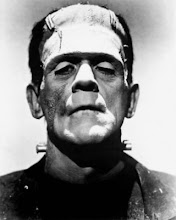I was inspired by this novel to write my own opinion of what transpired in the novel.

Love and hate, beauty and ugliness, opinions of society, knowledge and forbidden knowledge, duty, compassion and disassociation.
The Frankenstein monster acquired knowledge and through this medium, he saw beauty and gained the appreciation for knowing the difference between right and wrong. He no longer stole from his protectors. He felt love and compassion towards them instead of hurting them when they attacked him. He wanted to be loved and accepted and due to this strong urge, he pleaded with Victor to make a companion for him so he would not be alone. He was abandoned by his creator/father. He was feeling the most basic human feelings and that is to want love or to be loved. He was not the monster that society perceived him to be; he was gentle and caring.
Victor hated the vile creature he had created. He shunned the monster because he not only created a hideous creature, but he relied on what society would say if they found out what he did. He did not accept his duties as a parent would a child, instead he abhorred this creation/son and disconnected himself from the monster. Unlike the monster, Victor had used the knowledge he had gained to do something he absolutely regretted and that was to breathe life into this creature, he was consumed at one time by ambitious gain.
The monster had become very humane, he wept, felt alone, hungry, felt what it was to love, enjoyed music. Victor on the other hand was slowly becoming like a monster. He felt hate and acted on revenge. The monster felt remorse after he did something wrong.
In the novel he says, “Everywhere I see bliss, from which I am irrevocably excluded. I was benevolent and good; misery made me a fiend. Make me happy and I shall again be virtuous." The monster is "miserably alone.” The monster begs for the redeeming power of love.
“I am malicious because I am miserable” states the monster. He is able to distinguish these feelings.
In the Romantic Era, emotions played a tremendous role in the way society was shaped. Both Victor and the monster were fuelled by passion and anger, love and hate. We see this relayed over and over again in the novel. When the monster kills Elizabeth, out of the revenge, Victor is also mad with revenge. Frankenstein felt unloved when he had lost all; they both aspired for love which was hard to attain. They both duel each other to a miserable end.
This Love/Hate Story has sparked a series of movies and plays. One such movie was the 1994 Frankenstein.
_ Ann-Marie
picture from www.irishtimes.com/blogs/screenwriter

No comments:
Post a Comment